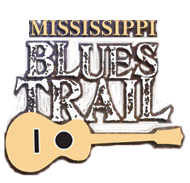Tommy McClennan
Tommy McClennan - Yazoo City
This marker is temporarily down for repair.
Tommy McClennan (c. 1905-1961) was one of America’s most successful down-home blues recording artists during the period when he recorded 20 singles for the Bluebird label (1939-1942). Among McClennan’s most notable numbers were “Bottle It Up and Go,” “Cross Cut Saw,” “Travelin’ Highway Man,” and “New Highway No. 51 Blues.” McClennan, famed for his raucous, uninhibited singing and guitar playing, frequented this section of Yazoo City when he lived on the nearby J. F. Sligh plantation.
Tommy McClennan was born in Yazoo City in April of 1908, according to Big Bill Broonzy in his book “Big Bill Blues.” However, McClennan’s death certificate cites his birthplace as Durant (Holmes County) and the date as January 4, 1905. He is shown with his mother Cassie and his siblings in the 1910 census in Carroll County, and in 1920 the family was living on a plantation near Sidon in Leflore County. McClennan and his wife Ophelia were also enumerated in the 1930 Leflore County census, with his occupation listed as teamster. His name was variously spelled McClinton, McLindon, McCleland, and McClenan on these documents, although the McClennan spelling was used on all of his recordings. Other bluesmen remembered him from elsewhere in the Delta, including Bolivar County and Vance, but he was best known around Greenwood, where Booker Miller, a protege of Charley Patton, knew him as “Sugar,” and Yazoo City, where local resident Herman Bennett, Jr., and others called him “Bottle Up,” after his most popular song, “Bottle It Up and Go.” When Miller quit playing in 1937, he sold his guitar to McClennan. In the Greenwood area, McClennan’s performing partners included Robert Petway and Honeyboy Edwards. When Samuel Charters traveled to Yazoo City doing research for his book “The Country Blues” in the 1950s, he learned that McClennan had lived on the Sligh plantation and liked to hang out on Water Street at the Ren Theater, an adjacent barroom, and a pool hall. Bennett also recalled him from the Cotton Club, a popular blues spot on Champlin Avenue.
McClennan began his recording career in 1939 after white Chicago record producer Lester Melrose came looking for him. Broonzy recounted that Melrose had to make a hurried exit when his presence angered locals who thought he was recruiting laborers to leave Mississippi. In Chicago McClennan, “one of the most ferocious blues singers to get near a microphone,” in the words of Charters, unleashed his gruff, unbridled blues in the studio, sometimes further energizing the recordings with lively comments urging himself on. According to Broonzy, McClennan was chased from a Chicago party when revelers objected to the controversial lyrics McClennan sang in “Bottle It Up and Go.” McClennan’s friend Robert Petway also recorded sixteen songs for Bluebird. Petway (aka Petaway or Pettiway) shared a similar, if less rough-hewn and exuberant, performing style with McClennan. They were of similar diminutive height and were sometimes taken to be brothers. Their recording careers both ended in 1942, although Bluebird and RCA Victor continued to release McClennan singles for several years. McClennan moved to Chicago but there are few reports of him performing there. The last time Honeyboy Edwards saw him, McClennan was drinking heavily and living in a hobo jungle. McClennan died of bronchopneumonia in Chicago on May 9, 1961.
content © Mississippi Blues Commission
[ BACK TO TOP ]

